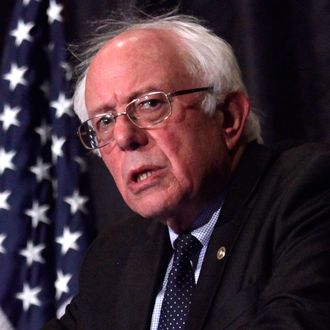
Anyone who stares at polls for a good while probably knows that Bernie Sanders is significantly more popular with both independents and Republicans than is Hillary Clinton. Indeed, this is probably at the heart of Sanders’s fairly regular advantage over HRC in general-election trial heats.
There are two common interpretations of Sanders’s regularly higher ratings among non-Democrats. The first, popular among Clinton supporters, is that he simply isn’t well-known enough to draw the ire of conservatives and moderates. The second, which you hear some Bernie fans articulate, is that he represents a subterranean majority of voters that transcends party labels. The first take undermines Sanders’s electability claims; the latter reinforces it.
But there’s a third interpretation that should arise every time one hears Sanders described as an “independent running for the Democratic nomination” or even as a “democratic socialist.” What he’s not being described as is a Democrat.
At the Upshot this weekend, political scientist Lynn Vavreck reminded us that pure, simple partisanship is largely what is driving the anger in American politics at the moment:
“That Democrats and Republicans have different views on issues — even issues about race and rights — is not surprising. But recent work by Stanford University’s Shanto Iyengar and his co-authors shows something else has been brewing in the electorate: a growing hostility toward members of the opposite party. This enmity, they argue, percolates into opinions about everyday life.”
Partisans, for example, are now more concerned that their son or daughter might marry someone of the opposite party (compared with Britain today and the United States in 1960). They also found that partisans are surprisingly willing to discriminate against people who are not members of their political party.
We’ve entered an age of party-ism.
So, being less marked with the sign of the Democratic beast, it’s unsurprising that Sanders is less despised by those who dislike that party (Republicans) or both parties (true independents).
Would that survive a Democratic national convention in which Sanders (assuming he somehow wins the nomination) is kissing every Democratic icon in sight? And is then embraced in the final emotional moments of the convention by Hillary and Bill Clinton and Barack Obama?
I don’t think so. Whatever vehicle Sanders rides into Philadelphia on, he would ride out of Philadelphia on a donkey. That could lose him some points among non-Democrats.






























